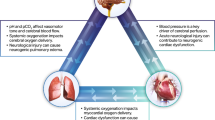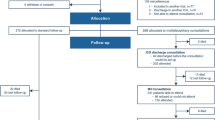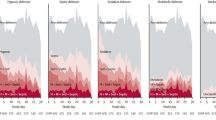Abstract
Introduction
Family members of critically ill patients suffer from high levels of anxiety and depression in the ICU, and are at risk of developing post-ICU syndrome following ICU discharge. In the case of brain death, and potential organ donation, the family is at the center of the decision process: within a limited time frame, the family will be informed that the patient is brain-dead and will be approached about potential organ donation.
Materials and methods
Family experience with organ donation has been the topic of several research papers allowing one to gain knowledge about family members’ experience of organ donation, emphasizing specific needs, adequate support, and pointing out gaps in current delivery of family-centered care. In this narrative review, experts, clinicians, and researchers present the various legal systems regarding family implication in organ donation decisions; describe factors that influence the decision-making process; highlight family perspectives of care and respect for potential donors in the ICU environment; describe the impact of organ donation discussions and decisions on post-ICU syndrome; and suggest communication skills and support to be developed in the future. A research agenda for the next decade is also encouraged.
Conclusion
Overall, challenges remain and concern all persons involved in the process, ICU doctors and nurses, the organ procurement organization, family members, and, in some cases, the patients themselves. Looking at the big picture will provide opportunities for further improvements.



Similar content being viewed by others
References
Azoulay E, Chevret S, Leleu G et al (2000) Half the families of intensive care unit patients experience inadequate communication with physicians. Crit Care Med 28(8):3044–3049
Pochard F, Azoulay E, Chevret S et al (2001) Symptoms of anxiety and depression in family members of intensive care unit patients: ethical hypothesis regarding decision-making capacity. Crit Care Med 29(10):1893–1897
Azoulay E, Pochard F, Kentish-Barnes N et al (2005) Risk of post-traumatic stress symptoms in family members of intensive care unit patients. Am J Respir Crit Care Med 171(9):987–994
Kentish-Barnes N, Chaize M, Seegers V et al (2015) Complicated grief after death of a relative in the intensive care unit. Eur Respir J 45(5):1341–1352
Potter JE, Herkes RG, Perry L et al (2017) COMmunication with Families regarding ORgan and Tissue donation after death in intensive care (COMFORT): protocol for an intervention study. BMC Health Serv Res 17(1):42
Nelson JE, Mulkerin CM, Adams LL et al (2006) Improving comfort and communication in the ICU: a practical new tool for palliative care performance measurement and feedback. Qual Saf Health Care 15:264–271
Nelson JE, Puntillo KA, Pronovost PJ et al (2010) In their own words: patients and families define high-quality palliative care in the intensive care unit. Crit Care Med 38(3):808–818
Long AC, Curtis JR (2014) Quality of dying in the ICU: understanding ways to make it better. Intensive Care Med 40(11):1793
Davidson JE, Jones C, Bienvenu OJ (2012) Family response to critical illness: postintensive care syndrome–family. Crit Care Med 40(2):618–624
Gries CJ, Engelberg R, Kross EK et al (2010) Predictors of symptoms of post-traumatic stress and depression in family members after patient death in the ICU. Chest 137(2):280–287
Kentish-Barnes N, Duranteau J, Montlahuc C et al (2017) Clinicians' perception and experience of organ donation from brain-dead patients. Crit Care Med 45(9):1489–1499
den Hartogh G (2012) The role of the relatives in opt-in systems of postmortal organ procurement. Med Health Care Philos 15(2):195–205
Rosenblum AM, Horvat LD, Siminoff LA et al (2012) The authority of next-of-kin in explicit and presumed consent systems for deceased organ donation: an analysis of 54 nations. Nephrol Dial Transpl 27(6):2533–2546
Toews M, Caulfield T (2016) Evaluating the "family veto" of consent for organ donation. CMAJ 188(17–18):E436–E437
Siminoff LA, Gordon N, Hewlett J, Arnold R (2001) Factors influencing families’ consent for donation of solid organs for transplantation. JAMA 286(1):71–77
Siminoff LA, Mercer MB, Graham G, Burant C (2007) The reasons families donate organs for transplantation: implications for policy and practice. J Trauma Inj Infect Crit Care 62:969–978
Walker W, Broderick A, Sque M (2013) Factors influencing bereaved families’ decisions about organ donation: an integrative literature review. West J Nurs Res 35:1339–1359
Rodrigue JR, Cornell DL, Krouse J, Howard RJ (2010) Family initiated discussions about organ donation at the time of death. Clin Transpl 24:493–499
Simpkin AL, Robertson LC, Barber VS, Young JD (2009) Modifiable factors influencing relatives’ decision to offer organ donation: systematic review. BMJ 338:b991
López JS, Martínez JM, Soria-Oliver M et al (2018) Bereaved relatives’ decision about deceased organ donation: an integrated psycho-social study conducted in Spain. Soc Sci Med 205:37–47
Miller C, Breakwell R (2018) What factors influence a family’s decision to agree to organ donation? A critical literature review. Lond J Prim Care (Abingdon) 10:103–107
Frutos MA, Blanca MJ, Mansilla JJ et al (2005) Organ donation: a comparison of donating and nondonating families. Transpl Proc 37:1557–1559
Traino HM, Siminoff LA (2013) Attitudes and acceptance of first person authorization: a national comparison of donor and nondonor families. J Trauma Acute Care Surg 74(1):294–300
Siminoff LA, Arnold RM, Hewlett J (2001) The process of organ donation and its effect on consent. Clin Transplant 15:39–47
U.S. Department of Health and Human Services (2018) Organ donation statistics. US Government Information on Organ Donation and Transplantation. https://www.organdonor.gov/statistics-stories/statistics.html. Accessed 15 Oct 2018
Sarti AJ, Sutherland S, Healey A et al (2018) A multicenter qualitative investigation of the experiences and perspectives of substitute decision makers who underwent organ donation decisions. Prog Transpl 28(4):343–348
Michetti CP, Newcomb A, Thota V, Liu C (2018) Organ donation education in the ICU setting: a qualitative and quantitative analysis of family preferences. J Crit Care 48:135–139
Siminoff LA, Marshall HM, Dumenci L et al (2009) Communicating effectively about donation: an educational intervention to increase consent to donation. Prog Transpl 19:35–43
Siminoff LA, Molisani AJ, Traino HM (2015) A comparison of the request process and outcomes in adult and pediatric organ donation. Pediatrics 136:e108–e114
Ralph A, Chapman JR, Gillis J et al (2014) Family perspectives on deceased organ donation: thematic synthesis of qualitative studies. Am J Transpl 14:923–935
Siminoff LA, Lawrence RH, Zhang A (2002) Decoupling: what is it and does it really help increase consent to organ donation? Prog Transpl 12:52–60
Potter JE, Perry L, Elliott RM et al (2018) Communication with Families Regarding Organ and Tissue Donation after Death in Intensive Care (COMFORT): a multicentre before-and-after study. Crit Care Resusc 20(4):268–276
de Groot J, van Hoek M, Hoedemaekers C et al (2016) Request for organ donation without donor registration: a qualitative study of the perspectives of bereaved relatives. BMC Med Ethics 17:38
Siminoff LA, Traino HM, Genderson MW (2015) Communicating effectively about organ donation: a randomized trial of a behavioral communication intervention to improve discussions about donation. Transpl Direct 1:1–9
Haddow G (2004) Donor and nondonor families’ accounts of communication and relations with healthcare professionals. Prog Transpl 14:41–48
Rodrigue JR, Cornell DL, Howard RJ (2008) Pediatric organ donation: what factors most influence parents’ donation decisions? Pediatr Crit Care Med 9:180–185
Siminoff LA, Lawrence RH, Arnold RM (2003) Comparison of black and white families’ experiences and perceptions regarding organ donation requests. Crit Care Med 31:146–151
Siminoff LA, Burant CJ, Ibrahim SA (2006) Racial disparities in preferences and perceptions regarding organ donation. J Gen Intern Med 21:995–1000. https://doi.org/10.1007/BF02743151
Flemming SSC, Redmond N, Williamson DH et al (2018) Understanding the pros and cons of organ donation decision-making: decisional balance and expressing donation intentions among African Americans. J Health Psychol. https://doi.org/10.1177/1359105318766212
Russell E, Robinson DH, Thompson NJ, Perryman JP, Arriola KRJ (2012) Distrust in the healthcare system and organ donation intentions among African Americans. J Commun Health 37(1):40–47
Davidson JE, Aslakson RA, Long AC et al (2017) Guidelines for family-centered care in the neonatal, pediatric, and adult ICU. Crit Care Med 45:103–128
de Groot J, van Hoek M, Hoedemaekers C et al (2015) Decision making on organ donation: the dilemmas of relatives of potential brain dead donors. BMC Med Ethics 16:64. https://doi.org/10.1186/s12910-015-0057-1
Jacoby LH, Breitkopf CR, Pease EA (2005) A qualitative examination of the needs of families faced with the option of organ donation. Dimens Crit Care Nurs 24:183–189
DeJong W, Franz HG, Wolfe SM et al (1998) Requesting organ donation: an interview study of donor and non-donor families. Am J Crit Care 7:13–23
Shih FJ, Lai MK, Lin MH et al (2001) The dilemma of ‘to-be or not-to-be’: needs and expectations of the Taiwanese cadaveric organ donor families during the pre-donation transition. Soc Sci Med 53:693–706
Moraes ELD, Massarollo MCKB (2008) Family refusal to donate organs and tissue for transplantation. Rev Lat Am Enfermagem 16:458–464
Sque M, Long T, Payne S et al (2008) Why relatives do not donate organs for transplants: ‘sacrifice’ or ‘gift of life’? J Adv Nurs 61:134–144
Bellali T, Papadatou D (2007) The decision-making process of parents regarding organ donation of their brain dead child: a Greek study. Soc Sci Med 64:439–450
Neate SL, Marck CH, Skinner M et al (2015) Understanding Australian families’ organ donation decisions. Anaesth Intensive Care 43:42–50
Bastami S, Krones T, Biller-Andorno N (2016) Relatives’ experiences of loved ones’ donation after circulatory and brain death. A qualitative inquiry. Bioethica Forum 9:17–25
Sque M, Walker W, Long-Sutehall T et al (2018) Bereaved donor families' experiences of organ and tissue donation, and perceived influences on their decision making. J Crit Care 45:82–89
Walker W, Sque M (2016) Balancing hope and despair at the end of life: the contribution of organ and tissue donation. J Crit Care 32:73–78
Jansen NE, van Leiden HA, Haase-Kromwijk BJ et al (2011) Appointing ‘trained donation practitioners’ results in higher family consent rate in the Netherlands: a multicenter study. Transpl Int 24:1189–1197
Hulme W, Allen J, Manara AR et al (2016) Factors influencing the family consent rate for organ donation in the UK. Anaesth 71:1053–1063
Forsberg A, Lennerling A, Fridh I et al (2015) Attitudes towards organ donor advocacy among Swedish intensive care nurses. Nurs Crit Care 20:126–133
McKeown DW, Bonser RS, Kellum JA (2012) Management of the heartbeating brain-dead organ donor. Br J Anaesth 108(S1):i96–i107
Sque M, Morgan M, Randhawa G et al (2013) Bereaved families’ experiences of organ and tissue donation, and perceived influences on their decision making. Final report submitted to the British Department of Health
Sque M, Galasinski D (2013) ‘Keeping her whole’: bereaved families’ accounts of declining a request for organ donation. Camb Q Healthc Ethics 22:55–63
Shemie SD, Robertson A, Beitel J et al (2017) End-of-life conversations with families of potential donors: leading practices in offering the opportunity for organ donation. Transplantation 101:S17–S26
Mills L, Koulouglioti C (2016) How can nurses support relatives of a dying patient with organ donation option? Nurs Crit Care 21:214–224
Erwin J, Kompanje O (2015) Families and brain death. Semin Neurol 35:169–173
Sque M, Payne SA (1996) Dissonant loss: the experiences of donor relatives. Soc Sci Med 43:1359–1370
Kentish-Barnes N, Chevret S, Cheisson G et al (2018) Grief symptoms in relatives who experienced organ request in the ICU. Am J Respir Crit Care Med 198(6):751–758
Jacoby L, Jaccard J (2010) Perceived support among families deciding about organ donation for their loved ones: donor vs nondonor next of kin. Am J Crit Care 19(5):e52–61
Rodrigue JR, Cornell DL, Howard RJ (2008) The instability of organ donation decisions by next-of-kin and factors that predict it. Am J Transpl 8(12):2661–2667
Tawil I, Brown LH, Comfort D et al (2014) Family presence during brain death evaluation: a randomized controlled trial. Crit Care Med 42(4):934–942
Sque M, Long T (2003) Organ and tissue donation: exploring the needs of the families. Summary of the final report sponsored by the British Organ Donor Society. http://eprints.soton.ac.uk/11140/
Kesselring A, Kainz M, Kiss A (2007) Traumatic memories of relatives regarding brain death, request for organ donation and interactions with professionals in the ICU. Am J Transpl 7(1):211–217
Sque M, Long T, Payne S (2005) Organ donation: key factors influencing families' decision-making. Transpl Proc 37:543–546
Cleiren MP, Van Zoelen AA (2002) Post-mortem organ donation and grief: a study of consent, refusal and well-being in bereavement. Death Stud 26(10):837–849
Merchant DJ, Yoshida EM, Lee TK et al (2008) Exploring the psychological effects of deceased organ donation on the families of the organ donors. Clin Transpl 22:341–347
Stocks L, Cutler JA, Kress T, Lewino D (1992) Dispelling myths regarding organ donation: the donor family experience. J Transpl Coord 2:147–152
Bellali T, Papadatou D (2006) Parental grief following the brain death of a child: does consent or refusal to organ donation affect their grief? Death Studies 30(10):883–917
Stouder DB, Schmid A, Ross SS et al (2009) Family, friends, and faith: how organ donor families heal. Progr Transpl 19(4):358–361
Kentish-Barnes N, Cohen-Solal Z, Souppart V et al. Being convinced and taking responsibility: a qualitative study of family members' experience of organ donation decision and bereavement after brain death. Crit Care Med 2019. https://doi.org/10.1097/CCM.0000000000003616
Wojda TR, Stawicki Stanislaw PA, SP, et al (2017) Keys to successful organ procurement: an experience-based review of clinical practices at a high-performing health-care organization. Int J Crit Illn Inj Sci 7:91–100
Domínguez-Gil B, Coll E, Elizalde J et al (2017) Expanding the donor pool through intensive care to facilitate organ donation: results of a Spanish multicenter study. Transplantation 101(8):e265–e272
Author information
Authors and Affiliations
Corresponding author
Ethics declarations
Conflicts of interest
Authors have no conflict of interest in relation to the paper.
Ethical approval
An approval by an ethics committee was not applicable.
Additional information
Publisher's Note
Springer Nature remains neutral with regard to jurisdictional claims in published maps and institutional affiliations.
Electronic supplementary material
Below is the link to the electronic supplementary material.
Rights and permissions
About this article
Cite this article
Kentish-Barnes, N., Siminoff, L.A., Walker, W. et al. A narrative review of family members’ experience of organ donation request after brain death in the critical care setting. Intensive Care Med 45, 331–342 (2019). https://doi.org/10.1007/s00134-019-05575-4
Received:
Accepted:
Published:
Issue Date:
DOI: https://doi.org/10.1007/s00134-019-05575-4




